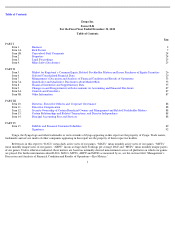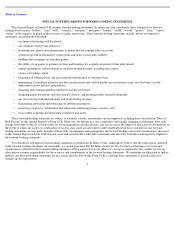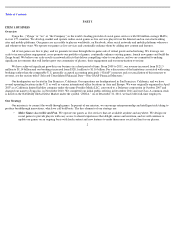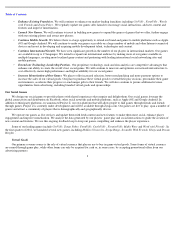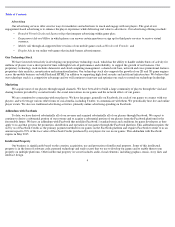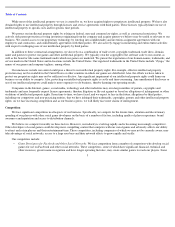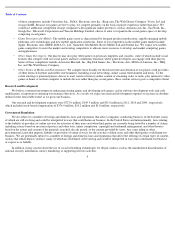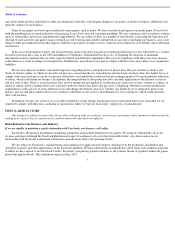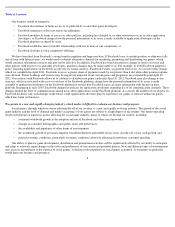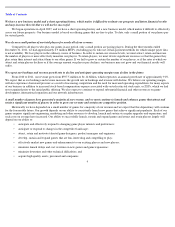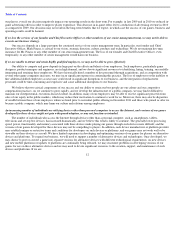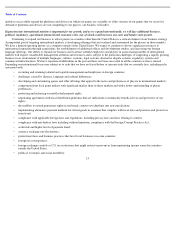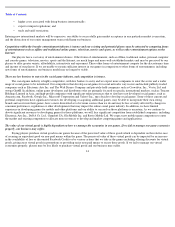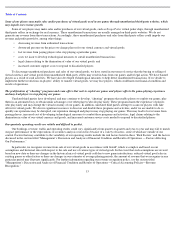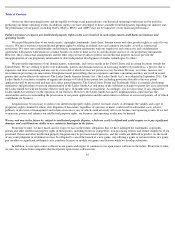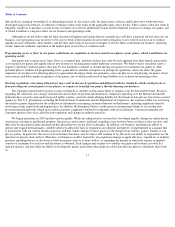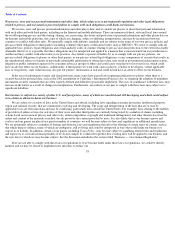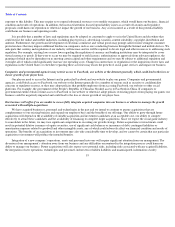Zynga 2011 Annual Report Download - page 14
Download and view the complete annual report
Please find page 14 of the 2011 Zynga annual report below. You can navigate through the pages in the report by either clicking on the pages listed below, or by using the keyword search tool below to find specific information within the annual report.
Table of Contents
It is difficult to consistently anticipate player demand on a large scale, particularly as we develop games in new genres or new markets,
including international markets and mobile platforms. If we do not successfully launch games that attract and retain a significant number of
players and extend the life of our existing games, our market share, reputation and financial results will be harmed.
If our top games do not maintain their popularity, our results of operations could be harmed.
In addition to creating new games that are attractive to a significant number of players, we must extend the life of our existing games, in
particular our most successful games. For a game to remain popular, we must constantly enhance, expand or upgrade the game with new features
that players find attractive. Such constant enhancement requires the investment of significant resources, particularly with older games and such
costs on average have increased. We may not be able to successfully enhance, expand or upgrade our current games. Any reduction in the
number of players of our most popular games, any decrease in the popularity of our games or social games in general, any breach of game-
related security or prolonged server interruption, any loss of rights to any intellectual property underlying such games, or any other adverse
developments relating to our most popular games, could harm our results of operations.
Any failure or significant interruption in our network could impact our operations and harm our business.
Our technology infrastructure is critical to the performance of our games and to player satisfaction. Our games run on a complex
distributed system, or what is commonly known as cloud computing. We own, operate and maintain the primary elements of this system, but
some elements of this system are operated by third parties that we do not control and which would require significant time to replace. We expect
this dependence on third parties to continue. In particular, a meaningful portion of our game traffic is hosted by Amazon Web Services
(“AWS”). In the fourth quarter of 2011, AWS hosted approximately one-third of our game traffic. AWS provides us with computing and storage
capacity pursuant to an agreement that continues until terminated by either party. We have experienced, and may in the future experience,
website disruptions, outages and other performance problems due to a variety of factors, including infrastructure changes, human or software
errors and capacity constraints. For example, the operation of a few of our significant games, including FarmVille and CityVille
, was interrupted
for several hours in April 2011 due to a network outage. If a particular game is unavailable when players attempt to access it or navigation
through a game is slower than they expect, players may stop playing the game and may be less likely to return to the game as often, if at all. A
failure or significant interruption in our game service would harm our reputation and operations. We expect to continue to make significant
investments to our technology infrastructure to maintain and improve all aspects of player experience and game performance. To the extent that
our disaster recovery systems are not adequate, or we do not effectively address capacity constraints, upgrade our systems as needed and
continually develop our technology and network architecture to accommodate increasing traffic, our business and operating results may suffer.
We do not maintain insurance policies covering losses relating to our systems and we do not have business interruption insurance.
Security breaches, computer viruses and computer hacking attacks could harm our business and results of operations.
Security breaches, computer malware and computer hacking attacks have become more prevalent in our industry, have occurred on our
systems in the past and may occur on our systems in the future. Any security breach caused by hacking, which involves efforts to gain
unauthorized access to information or systems, or to cause intentional malfunctions or loss or corruption of data, software, hardware or other
computer equipment, and the inadvertent transmission of computer viruses could harm our business, financial condition and operating results.
We have experienced and will continue to experience hacking attacks. Because of our prominence in the social game industry, we believe we are
a particularly attractive target for hackers. Though it is difficult to determine what harm may directly result from any specific interruption or
breach, any failure to maintain performance, reliability, security and availability of our network infrastructure to the satisfaction of our players
may harm our reputation and our ability to retain existing players and attract new players.
10


